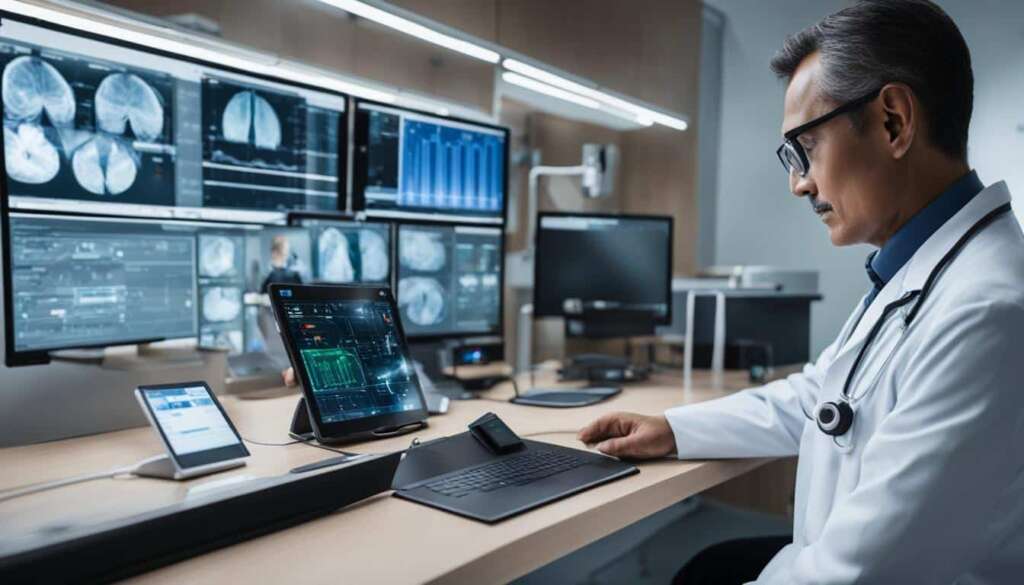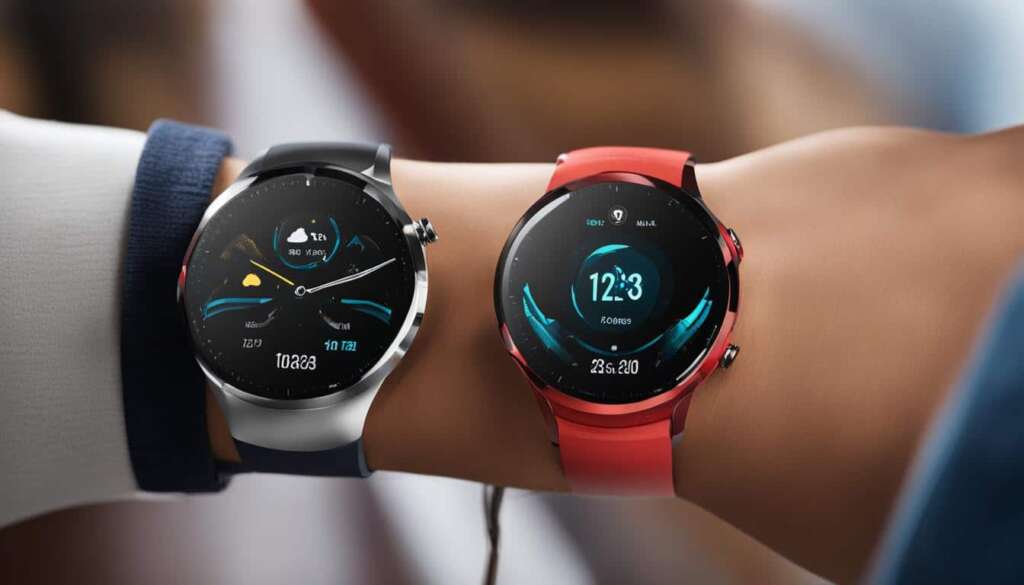Table of Contents
mHealth, short for mobile health, is a rapidly developing field that combines mobile technology and modern healthcare to provide patients with more accessible and personalized care. In this section, we will delve into the concept of mHealth and explore its significance in shaping the future of medical services and patient care.
With the integration of mobile devices, such as smartphones and wearables, into healthcare delivery, mHealth offers a range of benefits, including remote patient monitoring, telemedicine, and health tracking apps. These applications have transformed the healthcare industry, enabling patients to access medical information and support from anywhere in the world while promoting preventative care and improving patient outcomes.
In the following sections, we will examine what mHealth is, its impact on healthcare, and the challenges and opportunities associated with its implementation.
Key Takeaways:
- mHealth combines mobile technology and modern healthcare for personalized care.
- Mobile devices enable remote patient monitoring and telemedicine.
- mHealth promotes preventative care and improves patient outcomes.
- In the following sections, we will examine what mHealth is, its impact on healthcare, and the challenges and opportunities associated with its implementation.
What is mHealth?
mHealth refers to the use of mobile technology in healthcare services, enabling the remote delivery of medical information, preventative care, and personalized treatments to patients. The field of mHealth has rapidly evolved with the proliferation of smartphones and wearables, providing unprecedented access to healthcare services for patients in both developed and developing countries.
Mobile devices, including smartphones and wearables, have drastically transformed the way we approach healthcare delivery, promoting healthcare accessibility and providing innovative solutions for personalized patient care. These technologies enable patients to monitor their health and receive treatment remotely, regardless of their physical location or ability to travel.
The use of mobile technology in healthcare services has the potential to revolutionize the traditional healthcare model, reducing the burden on healthcare systems and improving patient outcomes. By leveraging the power of mobile technology, healthcare services can now reach remote or underprivileged areas, providing vital healthcare services to those in need.
The Impact of mHealth on Healthcare
MHealth has emerged as a crucial aspect of digital transformation in the healthcare industry, unlocking a plethora of innovative applications that have had a significant impact on healthcare services and patient outcomes. Let us delve into the impact of mHealth on healthcare and explore the benefits and challenges associated with its implementation.
Remote Patient Monitoring
Remote patient monitoring (RPM) is a powerful application of mHealth that has gained immense traction in recent times. It involves the use of wearable devices and sensors that allow healthcare professionals to track patients’ health status in real-time, even when they are not physically present in the healthcare facility. RPM can improve patient outcomes by enabling early detection of health issues and timely intervention, reducing readmission rates, and enhancing patient satisfaction.
Telemedicine
Telemedicine, another groundbreaking application of mHealth, has transformed the traditional patient-physician interaction by enabling remote consultations between doctors and patients, using videoconferencing and other digital communication tools. Telemedicine has improved healthcare access and convenience, particularly for patients living in remote or rural areas, who previously had limited access to healthcare services. Additionally, telemedicine has helped reduce healthcare costs by minimizing the need for in-person consultations.
Health Tracking Apps
Health tracking apps have become increasingly popular among patients, empowering them to take control of their health by monitoring their fitness levels, nutrition intake, and other health metrics. These apps can integrate with wearable devices to provide real-time data, encourage healthy behaviors, and allow patients to proactively manage their health. Health tracking apps have the potential to reduce healthcare costs by promoting preventative healthcare practices.
Digital Health Records
Digitization of healthcare records has revolutionized the management of patient information, allowing healthcare providers to access and share patient data seamlessly. Digital health records enable healthcare professionals to make informed decisions, minimize errors, and improve patient care. They also provide a cost-effective and eco-friendly alternative to traditional paper-based records.
Benefits and Challenges
The implementation of mHealth solutions has come with several benefits, such as improved healthcare access and patient outcomes, reduced healthcare costs, and enhanced patient satisfaction. However, challenges such as regulatory compliance, data privacy, and technical glitches continue to impede the adoption of mHealth solutions in the healthcare industry.
Overall, mHealth has had a transformative impact on the healthcare industry, opening up new avenues for healthcare innovation, accessibility, and cost-efficiency.
Conclusion
In summary, mHealth is a rapidly growing field that is transforming the healthcare industry. Its integration with mobile technology has enabled remote access to medical information, personalized treatments, and enhanced patient care. The impact of mHealth on healthcare has been significant, with innovative applications such as telemedicine and health tracking apps contributing to better health outcomes and improved accessibility.
While mHealth presents many benefits, it is not without its challenges. The implementation of mHealth solutions requires careful consideration of privacy and security concerns, as well as the need for regulatory compliance. However, with continued advancements in technology, mHealth has immense potential to revolutionize healthcare delivery and significantly impact the lives of patients.
As the demand for digital healthcare services continues to rise, it is clear that mHealth will play a pivotal role in shaping the future of the healthcare industry. By embracing mHealth and its transformative potential, we can work towards building a more efficient, effective, and accessible healthcare system for all.
FAQ
What is mHealth?
mHealth, short for mobile health, refers to the use of mobile technology in healthcare. It encompasses various applications, such as health-tracking apps, remote patient monitoring, and telemedicine, that leverage mobile devices to deliver medical information, personalized treatments, and preventative care to patients.
How does mHealth impact healthcare?
mHealth has a profound impact on healthcare by enabling innovative solutions that enhance accessibility, cost-efficiency, and patient outcomes. It allows healthcare providers to remotely monitor patients, offer virtual consultations through telemedicine, and facilitate the exchange of digital health records. With mHealth, healthcare services can reach a wider population, reduce healthcare costs, and engage patients in their own care management.
What are the benefits and challenges of implementing mHealth solutions?
Implementing mHealth solutions brings several benefits, including improved healthcare access, enhanced patient engagement, and better health outcomes. It empowers individuals to actively participate in their healthcare, promotes preventive measures, and enables early intervention. However, challenges such as privacy concerns, data security, interoperability, and the need for seamless integration into existing healthcare systems must be addressed to fully leverage the potential of mHealth.













